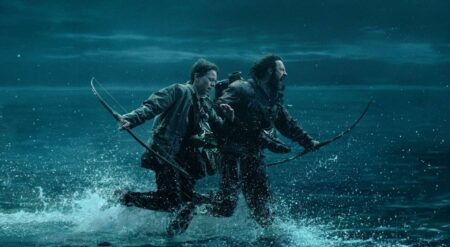
Munich: The Edge of War is a political thriller streaming on Netflix. In Europe, 1938, a war between Germany and the allied nations of Britain and France looks all but inevitable. Hitler is threatening to mobilize his army to take back a region of neighboring Czechoslovakia that was annexed from Germany by the Treaty of Versaille, which ended World War I. But there are those in Britain who still believe that peace is possible. There are those who still cling to hope.
As Germany, France, and Britain prepare to meet in Munich to settle the dispute of the disputed lands, a German agent is given a classified document that proves Hitler’s sole goal is European domination and that he will do whatever he has to achieve his goal. Now, with time running out, the agent must reach out to an estranged friend who works in the British government in an attempt to get the document to British Prime Minister Neville Chamberlain before he signs an agreement with Hitler that may well doom Europe to war.
It is hard to frame a story within the events of Europe’s political situation in the late 1930s without it getting completely engulfed by the larger personalities of the day. While Munich: The Edge of War does its best to keep the viewer focused on its star characters that scuttle behind the scenes attempting to change the course of the world, they are consistently lost whenever one of the historical personalities takes the stage. Though the fact that the viewer already knows that the attempts to sway Chamberlain’s mind about signing the agreement with Hitler will fail doesn’t make that task any easier.
While the movie tries to sell itself as a political thriller, the key aspect of the movie that overshadows the tense spy moments is its analysis of hope. And more precisely, the dangers of clinging to it relentlessly.
This look at the perils of hope comes most clearly through the personage of Neville Chamberlain. Chamberlain, (played by the always phenomenal Jeremy Irons) refuses to believe that there is no hope left for peace. Even when damning evidence that he is being manipulated and tricked is brought before him, he insists they must continue to hope. While the movie does an excellent job of framing this need to hope as a fruit of the trauma experienced living through the previous war, the movie itself makes it clear in no uncertain terms how wrong Chamberlain is. Believing that you can bring about authentic change through negotiations when you are negotiating with someone uninterested in any such change is the highest of follies. For that reason alone, I cannot help but feel like this movie’s core perspective of blind hope is extremely relevant for the modern-day when we find our political leaders continuing Chamberlain’s path of blindly hoping things will get better.
My biggest complaint with how Munich: The Edge of War frames its historical aspects comes at the extreme end of the movie. Just before the credits roll, text appears explaining how Chamberlain’s much desire and dearly bought peace only lasts one year. It goes on to state that, because of this year bought, the allies are better prepared to face Hitler’s war machine when the time comes. This feels like a bizarre attempt to spin good out of what was a diplomatic failure on every level—as if the stall for time was the end goal all along. Especially when one considers the historical evidence that suggests the German Army would have been dealt a severe bloody nose had it been forced to take the disputed lands rather than having them and by extension the rest of Czechoslovakia, gifted to them.
So while Munich: The Edge of War attempts to construct a political thriller surrounding one of the most infamous diplomatic moments in modern history, it ultimately fails to do so. And while it delivers a more potent warning about the dangers of clinging to hope, even when it has been made abundantly clear that hope is gone and you must accept a new truth, this message fails to salvage the movie from its lackluster focal point.
Munich: The Edge of War is streaming now on Netflix.
Munich: The Edge of War
-
Rating - 5/105/10
TL;DR
So while Munich: The Edge of War attempts to construct a political thriller surrounding one of the most infamous diplomatic moments in modern history, it ultimately fails to do so. And while it delivers a more potent warning about the dangers of clinging to hope, even when it has been made abundantly clear that hope is gone and you must accept a new truth, this message fails to salvage the movie from its lackluster focal point.






